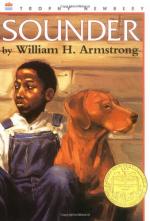|
This section contains 441 words (approx. 2 pages at 300 words per page) |

|
By leaving the family unnamed and by keeping the exact setting somewhat unclear, Armstrong makes the story more universal. The vagueness of the world outside the cabin reflects the limited vision and knowledge of the novel's illiterate protagonist. Armstrong uses a third-person limited omniscient point of view that focuses on how the boy thinks and reacts to events. This method of setting the story in a person's mind and trying to imitate the ways his mind works is called "psychological realism."
The boy's consciousness and innocence form the lens through which readers view his world.
Armstrong's descriptive powers are a strength in Sounder. His precise images are especially effective in portraying aspects of the family's daily routine. For example, his vivid description of them harvesting walnuts elevates a mundane activity to an almost mystical ritual: Inside the cabin, the boy's mother sat by the stove, picking...
|
This section contains 441 words (approx. 2 pages at 300 words per page) |

|




